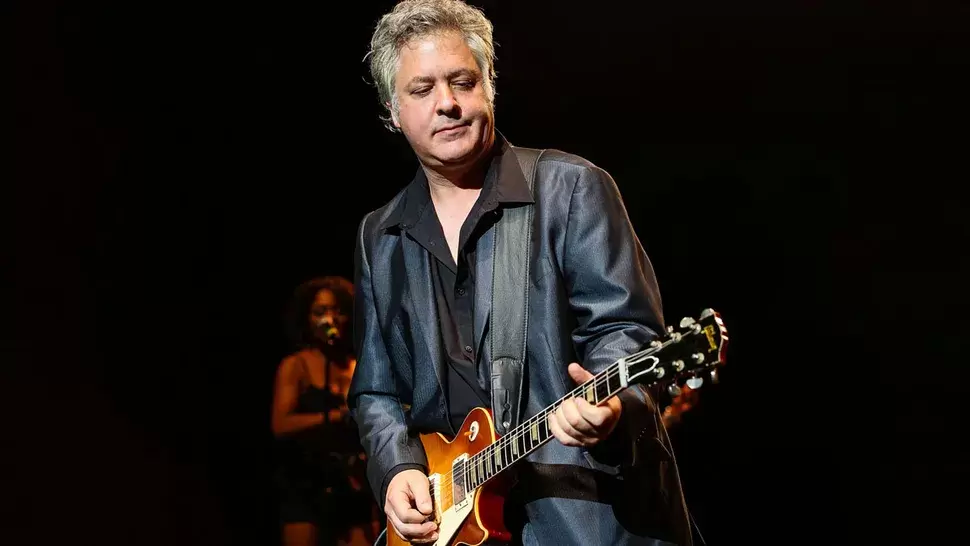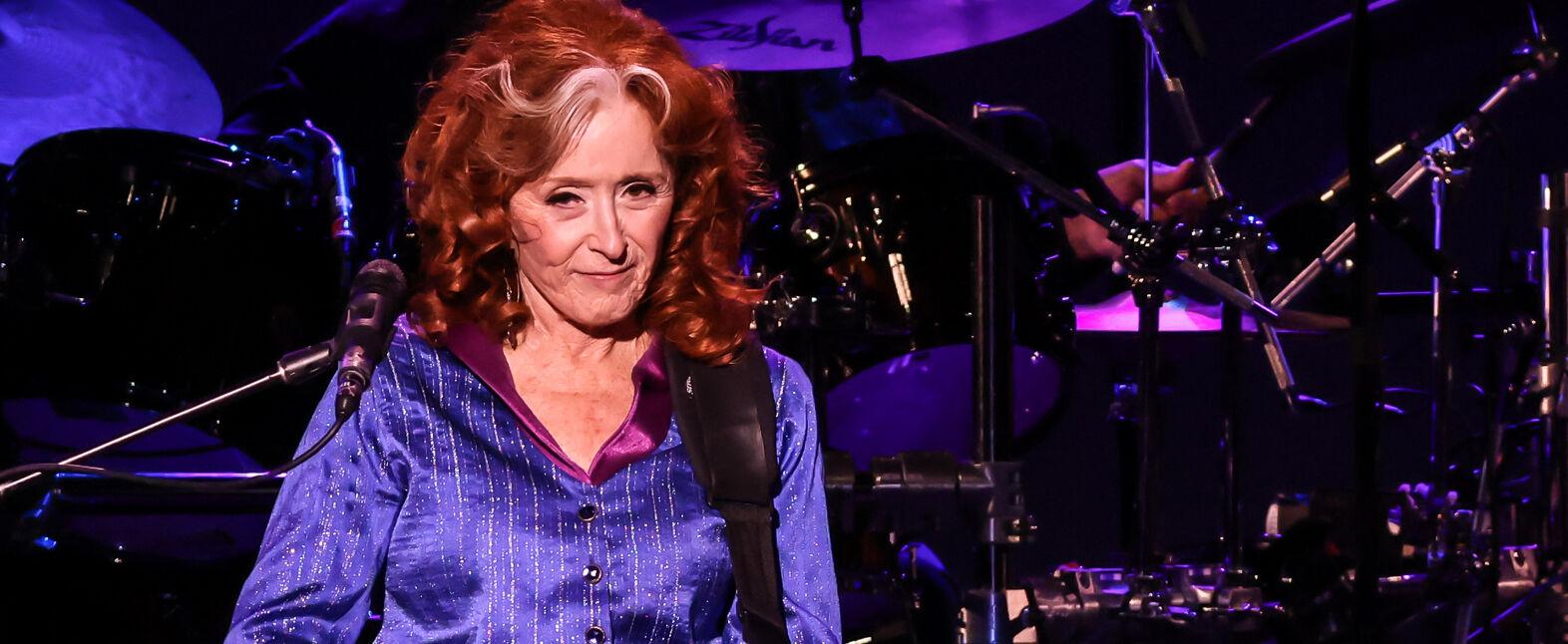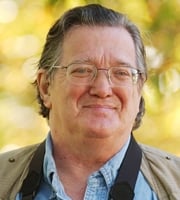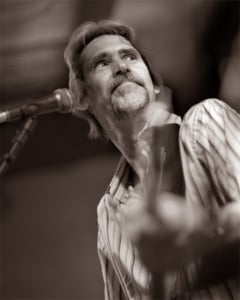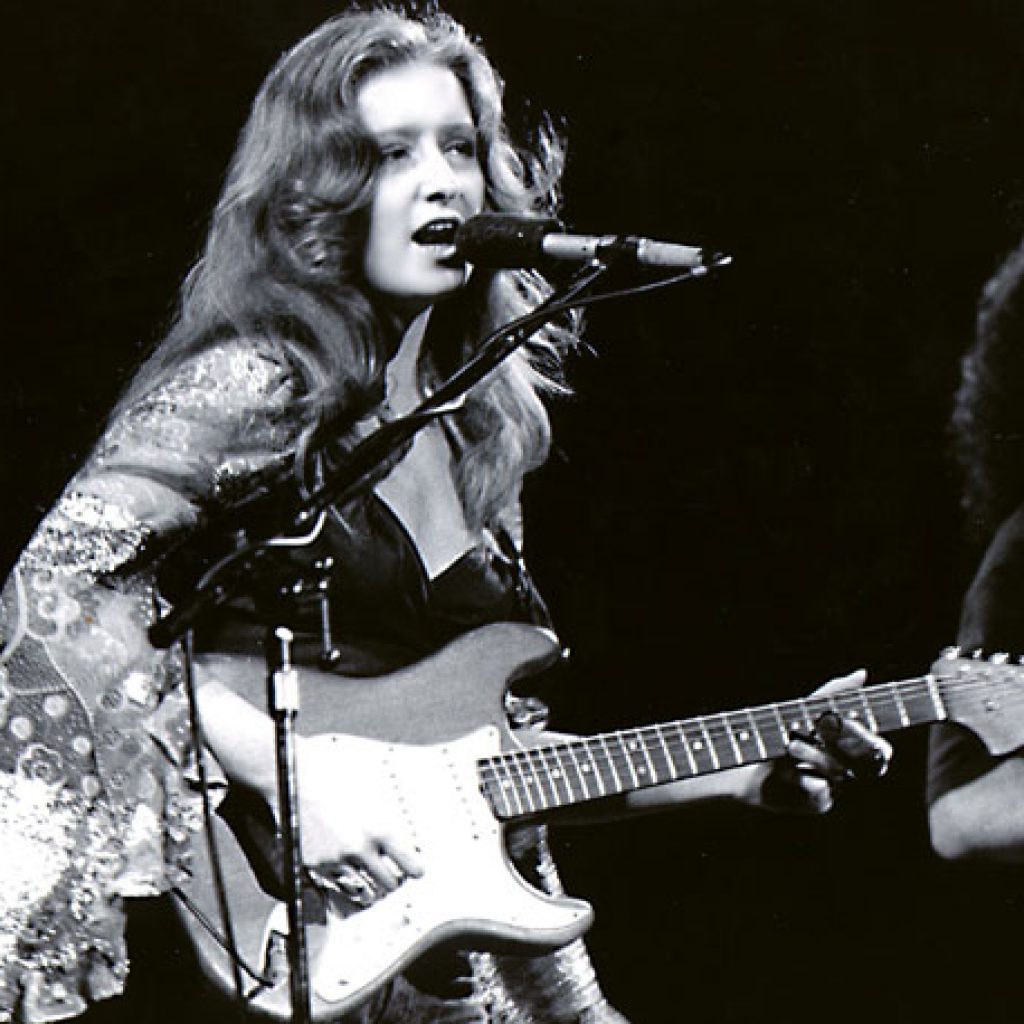![]()
![]() By George Varga | Feb. 20, 2016
By George Varga | Feb. 20, 2016
Bonnie Raitt was a precocious 21-year-old blues devotee when she recorded her self-titled debut album in 1971. Today, 10 Grammy Awards and 19 often splendid albums later, she remains a tireless champion of American roots-music — and one of its most vital performers.
She is also a beloved inspiration to a broad array of her fellow performers. Her admirers include such 2016 Grammy Award telecast performers as Adele, San Diego’s Andra Day and Best Country Album winner Chris Stapleton, who teamed with Raitt to and Gary Clark, Jr., on a searing, pitch-perfect version of B.B. King’s “The Thrill Is Gone” at Monday’s Grammy show. Raitt’s blues-drenched singing and stinging bottleneck guitar playing were both highlights.
“I’m absolutely a fan of hers.” Stapleton said backstage. “Isn’t everybody?”
“She’s a strong woman,” San Diego-bred singer Day said. “And she’s a great artist, singer, songwriter and guitar player.”
“She’s a lovely, lovely soul,” agreed Jon Cleary, a former Raitt band member and the 2016 Best Regional Roots Music Album Grammy winner. He co-wrote “Unintended Consequence of Love,” the riveting opening song on Raitt’s terrific new album, “Dig In Deep,” which will be released Friday.
At 66-going-on-16, Raitt has lost none of her enthusiasm or devotion to music, as the consistently absorbing “Dig In Deep” handily affirms. Her North American summer tour to promote the album includes a July 27 concert at the San Diego Civic Theatre.
The second consecutive release on her own label, Redwing Records, “Dig In Deep” comes out 45 years after her debut album. It is one of her most rewarding albums to date, which is saying a lot; a tantalizing mix of aching ballads, gritty rockers and rollicking blues shuffles, along with potent reinventions of INXS’ “Need You Tonight” and Los Lobos’ “Shakin’ Shakin’ Shakes” (the latter featuring some of her most galvanizing guitar work ever).
Bonnie Raitt, “Gypsy In Me”
Each song, including five gems written by Raitt, is delivered with the fire and finesse that have have long been her trademarks. True to the album’s title, she digs down to the essence of each note and lyric. What results sounds both fresh and timeless, as befits a veteran artist who is steeped in tradition, but not bound by it, deeply reverent to her musical inspirations, but eager to keep moving forward and explore new vistas.
“This album means a lot to me,” Raitt said, speaking from her Marin County home. “I put all my heart and soul into it.”
Yet, had all gone as this Burbank native envisioned back in the 1960s, things would be very different today.
“I went to college to be a social activist and community organizer with the American Friends Service Committee, which is the social resolution arm of the Quakers,” said Raitt, whose father, John Raitt, was an enduring star of musicals, on and off Broadway.
“I minored in African studies and was ready to move to Africa,” she continued. “Then I met (blues promoter, manager and album producer) Dick Waterman, and my life was changed when, through Dick, I met all my blues heroes. I took a leave of absence from school and got a record deal offered to me. I figured it would last a year, and then I’d go back to college.”
She never did, although Raitt proudly notes: “I got an honorary degree from the Berklee College of Music and received the Harvard University Arts Medal, which was wonderful.”
Matters of the heart
If there were medals for no-nonsense blues, soul-stirring ballads and roots-rocking romps, Raitt would surely qualify. Whether written by her or by some of the many talented troubadours she has long extolled, the songs she performs often chronicle matters of the heart with equal passion and insight.
Employing her distinctive blend of grit and grace, the emotionally charged “Dig In Deep” expertly conveys life’s highs, lows and various points in between. The results — much like Raitt herself — are alternately playful and pugnacious, taut and tender, earthy and elegant.
“Dig In Deep” also features a song that finds her exploring emotions rarely heard so overtly in her work: anger and contempt.
“The Comin’ Round Is Going Through” is a blistering, Rolling Stones-styled stomper that gives its targets nowhere to hide. The song’s lyrics take aim at morally wayward politicians, income inequality and narcoleptic media coverage. Its message and tone are so timely that some listeners might guess Raitt wrote the song specifically about the ongoing presidential primary campaign and the state of the nation.
“I had the idea for this song quite a while ago, before the (current) election cycle, or the ‘auction cycle,’ as I call it,” Raitt explained, speaking from her home in Marin County. “It’s about the absolute hijacking of the election process, starting with (the Supreme Court’s) Citizens United (ruling in 2010).
“I tried to make this song so that it wasn’t pointed to one news outlet, or point of view. Because I think that, if you were to talk to the opposite side of the political spectrum of myself, nearly everyone on both sides agrees the system is broken. And I don’t think anyone likes the millions of dollars going into campaigns, the lack of transparency, and the fact legislators are virtually bought off by taking contributions.”
To reinforce that this is a modern-day protest song in blues-rock garb, Raitt slyly emulates Bob Dylan’s nasally vocal delivery several times during “The Comin’ Round Is Going Through.”
“I did it, just naturally, and left it in because I think it’s cool,” she said.
“When we started doing ‘The Comin’ Round’ in rehearsal, it was natural for me to sing part of it like Dylan. He is such a huge influence on me that it feels good to be in solidarity with him. Apart from Pete Seeger and The Weavers, Bob was the first singer-songwriter I heard spitting that venom out. Not venom, but he just had a point of view. I didn’t plan it (to sound like him), but I left it in for a reason. I think everybody will be reminded of where we first heard that kind of biting delivery and (lyrics).
“We’ll see how it goes over (live). I started out this album knowing I was going to write some songs that went with (particular) grooves I wanted to do, and points of view I wanted to express. There’s a song I wrote years ago about jealousy and self-immolation, ’Spit of Love,’ where the music fits the words so well. When I play songs live that really move, and the music matches the groove perfectly, it’s very satisfying. I did ‘The Comin Round’ as a Stones-y, four-on-the-floor rocker, so that I can drive it hard (on stage). It’s very cathartic.”
Queen for a day?
On another song on her new album, the Gordon Kennedy and Wayne Fitzpatrick-penned “Gipsy In Me,” Raitt sings: “I ain’t no queen of hearts,” On her John Hiatt-penned 1989 hit, “Thing Called Love,” Raitt sings: “I ain’t no Queen of Sheba.”
But if she could be queen for a day, what, specifically, would she like to be the queen of, and why?
“Oh, what a great question!” Raitt said, then pondered it further. Her thought process provided a key insight into how Raitt remains so grounded in a music industry where being grounded can be a daily challenge.
“Well, I so am the kind of person that doesn’t want to be put above other people,” she said. “And other people wrote those lyrics; I didn’t write ‘Gipsy In Me’ or ‘Thing Called Love.’ But if I were queen for a day? Let’s see.”
She chuckled.
“If people don’t read the question first, I’ll sound pretty egotistical,” Raitt noted. “People will think I’m pontificating: ‘And another thing about me!’
“I’d love be the queen of curating great music of all styles, or many styles. I’m very proud of my ability to pull songs from different corners, and place them together in a different way. When people say: ‘Why don’t you do a whole blues album? Or a whole jazz album?’ I’d love to do a blues album, or jazz album. But I’d be too bored on the road just promoting that.”
The careful sequencing of the songs on “Dig In Deep” creates a musical and emotional arc; a flow of moods and styles that salutes the artful creation of albums as cohesive bodies of work. Moreover, the two exquisitely nuanced ballads that conclude the album — the Joe Henry-penned “You’ve Changed My Mind” and Raitt’s deeply moving “The Ones We Couldn’t Be” — would not provide such a memorable resolution if they didn’t follow the songs before it, or if those songs did not appear in the exact order that they do.
“For me, that is one of the best parts of making a record, and I still think of them as making albums,” Raitt said.
“As I do with my live shows, there’s a beginning, a middle and an end on my albums. And, basically, you’re couching those ballads. You have to put space between them, so that there are not too many fast songs, or too many devastating songs in a row.”
Musical healing
Raitt is no stranger to devastation.
Her mother died in 2004, followed a year later by her father, both after periods of decline. Then, in 2009, Raitt’s older brother, Stephen, died of brain cancer after an eight-year battle. Her heart-baring ballad “The Ones We Couldn’t Be,” which closes “Dig In Deep,” is so steeped in melancholic reflection — on the challenges of life and love, and the hard-won wisdom and insight only loss can bring — that it serves as a form of musical catharsis.
“You know, I’ve had some periods of heartache and loss over the past decades, as we all have, especially with me being close to so many older blues people,” she said. “By the time I hit 40, I’d lost half a dozen of the blues artists I’d grown close to. That’s the price; nobody knows when they’re going to go, including me.
“So the decade of illness and worry with my family, and the loss and suffering and grief, was very profound. I’m very glad I could take a year off, 2010, let all that pain come out and let it move through me, and not squelch it by staying busy. I had two album cycles in the middle of that decade (of her parents’ decline), and it was draining and doesn’t honor those people you’ve lost.”
Raitt did not make an album between 2005 and 2012, when “Slipstream” brought her back into the public eye. It won a Grammy, fueled a triumphant tour, and — most importantly — enabled Raitt to return to music. The aching “Slipstream” piano ballad, “God Only Knows,” also written by Joe Henry, was especially pivotal.
“That album brought me out in such a healing way,” Raitt said. “Joe wrote the song knowing what I had gone through … and it so perfectly expressed exactly that. ‘Slipstream’ was received so well, and I was finally back in the land of the living. Even though I so miss my family and the people I had to say goodbye to, I feel I was brought back into a spirit of buoyancy, which jump-started me back to touring again.
“I felt revitalized. And I have to say, the (‘Slipstream’) tour had a lot do with that.”
Raitt’s parents were both musically gifted, but her artistic heritage predated them both. While she didn’t know it until this interview, Raitt’s grandfather on her mother’s side was one of the first pastors at the United Methodist Church in Mission Hills and her mother was born while he was appointed here. Her grandfather, a skilled lap-pedal steel guitarist, taught Raitt to play in the open tunings favored by many blues artists.
“I never knew he was at that church at that time. It’s wonderful to find this out, because I can’t ask my mom anymore,” Raitt said. “He was magnificent. The Methodists move you around a lot, so he was switched around a lot in my mom’s childhood. He was very musical, as was my grandmother, and wrote over 500 songs. He was very adept on the guitar, as a lyricist and writing music. …
“Music is in my DNA, and I grew up in a house full of music. But I never thought I’d be in music.”
Paving the way
Artists as varied as Adele, Katy Perry, George Michael and Bon Iver have covered Raitt’s emotionally wrenching 1991 hit, “I Can’t Make You Love Me,” which was written by Allen Shamblin and former NFL All-Pro tackle Mike Reid. But Raitt’s influence as an electric guitarist, specializing in tart blues bottleneck and slide styles, is even more significant.
Indeed, when she was growing up, prominent women guitarists were few and far between, apart from gospel powerhouse Sister Rosetta Tharpe, finger-picking specialist Elizabeth Cotten, and a very few others. Today, aspiring young guitarists have a good number of female role models, including Raitt, St. Vincent, Ani DiFranco, Kaki King, Rory Block, Jennifer Batten, Orianthi…
“And Susan Tedeschi and (Alabama Shakes’) Brittany Howard,” Raitt interjected.
The majority of Raitt’s early blues guitar inspirations were men — Robert Johnson, Elmore James, Muddy Waters, Mississippi Fred McDowell, Son House, and the list goes on.
Did it make a difference to her to not have female role models on her chosen musical instrument?
“I never thought of it in terms of men or women,: Raitt replied. “I taught myself to play guitar because I was in love with Joan Baez’s voice, and she was also a Quaker.
“I taught myself country-blues off of records that didn’t even include women, but I didn’t think about it at the time. Dave Van Ronk, John Hammond, Jr., and (the trio) Koerner, Ray & Glover were the first people I heard who made me realize it was OK to be white and play blues, and that you weren’t (trespassing) on hallowed ground.
“Barbara Dane and Judy Roderick were two blues women in the 1960s who knocked me out. I knew about Sister Rosetta Tharpe, but a little later. Pops Staples was one of the guitar guys for me. And two of my heroes were Memphis Minnie and Sippie Wallace. I was inspired by the whole story about Minnie being a street busker and sometimes disguising herself as a man.
“I knew Aretha (Franklin) played piano, and thought it was great, because I loved the way she accompanied herself. And Ray Charles was as important to me as anybody. I learned off of records, as many of us kids did. I took piano lessons, but not guitar lessons. So I was trying to emulate how Fred McDowell, Son House and Robert Johnson played. There wasn’t any YouTube then, so I had to do it by ear.”
Before she was out of her teens, Raitt got to know some of her blues heroes. Many would remain close friends with her for the rest of their lives.
“I learned so much about the music business from them,” Raitt said. “And I learned what it was like for them, as black men and women in America. I had a lot of questions about what it was like in the 1920s and ‘30s, about who they were, and how they got to be who they were.”
And what about the iconic B.B. King, who Raitt saluted so memorably on stage at the Grammy Awards Monday?
“I knew B.B. since I was 19,” she said. “I’d run into him at blues festivals often, and at the Grammys. We had a wonderful friendship. He was a big supporter of my playing and singing, and that made me feel great, to have someone like him tell me I was really good. He said it over and over, that I was his favorite slide player, which bowled me over.
“If I go to the end of my life being able to say, ‘Well, at least B.B. King thought I was really good at this,’ I’ll be happy.”
george.varga@sduniontribune.com
Source: © Copyright The San Diego Union-Tribune





 Visitors Today : 22
Visitors Today : 22 Who's Online : 0
Who's Online : 0












